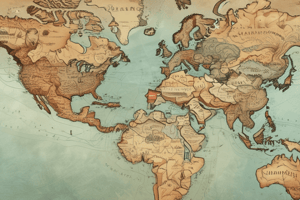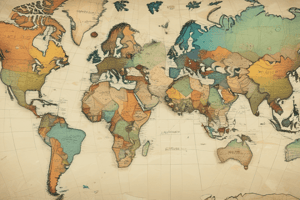Podcast
Questions and Answers
What is the primary focus of realism in international relations?
What is the primary focus of realism in international relations?
- Economic equality
- Power and security (correct)
- Cultural exchange
- Cooperation among states
Which entity is a primary actor in international relations?
Which entity is a primary actor in international relations?
- International Organizations
- Nation-states (correct)
- Private Citizens
- Non-Governmental Organizations (NGOs)
What does the concept of sovereignty refer to?
What does the concept of sovereignty refer to?
- The strength of military forces
- The ability to maintain a strong economy
- Influence of international organizations
- Authority of a state to govern itself (correct)
Which theory emphasizes the role of culture and social constructs in shaping international relations?
Which theory emphasizes the role of culture and social constructs in shaping international relations?
Which of the following describes unipolarity in international systems?
Which of the following describes unipolarity in international systems?
What does the balance of power refer to in international relations?
What does the balance of power refer to in international relations?
Which of the following is a significant challenge in contemporary international relations?
Which of the following is a significant challenge in contemporary international relations?
What is Marxism's perspective on international relations?
What is Marxism's perspective on international relations?
What is one of the primary roles of international organizations like the United Nations?
What is one of the primary roles of international organizations like the United Nations?
In the context of global interaction, what is globalization primarily concerned with?
In the context of global interaction, what is globalization primarily concerned with?
Flashcards are hidden until you start studying
Study Notes
Definition
- International relations (IR) is the study of interactions between countries and the factors influencing these interactions.
Key Concepts
- Sovereignty: The authority of a state to govern itself without external interference.
- State: A political entity with a defined territory, government, and population.
- Nation vs. State: A nation is a group of people with a common identity; a state is a political unit.
Theories of International Relations
-
Realism:
- Focus on power and security.
- States act in their self-interest, prioritizing survival.
- International politics is anarchic.
-
Liberalism:
- Emphasizes cooperation and international institutions.
- Believes that states can work together for mutual benefit.
- Advocates for democracy and human rights.
-
Constructivism:
- Focuses on social constructs and the role of ideas and identities.
- Emphasizes the influence of culture, norms, and values in shaping international relations.
-
Marxism:
- Analyzes international relations through the lens of class struggle and economic exploitation.
- Highlights the impact of capitalism on global power dynamics.
Key Actors
- States: Primary actors in international relations, engage in diplomacy, warfare, and treaties.
- International Organizations: Entities like the United Nations (UN) that facilitate cooperation between states.
- Non-Governmental Organizations (NGOs): Groups that influence international policies and advocate for various causes.
- Multinational Corporations (MNCs): Companies that operate in multiple countries and have significant economic influence.
Important Issues
- Conflict and War: Causes, resolution, and the impact of armed conflicts on international stability.
- Globalization: The increasing interconnectedness of economies, cultures, and politics.
- Human Rights: International frameworks to protect individual rights and freedoms.
- Environmental Challenges: Issues like climate change and resource scarcity affecting global relations.
International Systems
- Bipolarity: Two major powers dominate the international system (e.g., Cold War).
- Unipolarity: One dominant power (e.g., post-Cold War United States).
- Multipolarity: Multiple influential states sharing power.
Key Terms
- Balance of Power: Distribution of power among states to prevent any one entity from becoming too strong.
- Soft Power: Influence through culture, values, and policies rather than military force.
- Hard Power: Use of military and economic means to influence other states.
Current Trends
- Rise of Regional Powers: Countries like China and India gaining influence.
- Nationalism: Resurgence impacting international cooperation.
- Cybersecurity: Increasing importance of digital security in international relations.
- Global Health: International collaboration in response to pandemics and health crises.
Definition
- International relations (IR) examines the interactions among nations and the various factors that shape these interactions.
Key Concepts
- Sovereignty: The principle allowing a state to govern itself independently without external intervention.
- State: A political unit recognized as having a defined territory, a governing body, and a permanent population.
- Nation vs. State: A nation is defined by a shared identity among a group of people, while a state refers to the political structure governing a specific geographic area.
Theories of International Relations
- Realism: Centers on the role of power and security; states prioritize self-interest and survival in an anarchic system.
- Liberalism: Promotes the importance of cooperation among states; emphasizes the role of international institutions in fostering mutual benefits and advancing democracy and human rights.
- Constructivism: Investigates how social constructs, cultural norms, and values influence international relations, focusing on ideas and identities.
- Marxism: Views international relations through the lens of class struggle, highlighting the influence of economic exploitation and capitalism on global dynamics.
Key Actors
- States: The main players in international relations, involved in diplomacy, warfare, and forming treaties.
- International Organizations: Bodies like the United Nations (UN) that aim to promote global cooperation.
- Non-Governmental Organizations (NGOs): Entities that aim to influence global policies and advocate for various social issues.
- Multinational Corporations (MNCs): Businesses operating across multiple countries that wield significant economic power and influence.
Important Issues
- Conflict and War: Examines the causes of armed conflicts, their resolutions, and their effects on global stability.
- Globalization: Refers to the interconnected nature of economies, cultures, and political systems worldwide.
- Human Rights: Describes the international legal frameworks designed to safeguard individual freedoms and dignity.
- Environmental Challenges: Addresses global issues such as climate change and resource scarcity and their implications for international relations.
International Systems
- Bipolarity: Characterized by two dominant powers in the global arena, as seen during the Cold War.
- Unipolarity: A system where one state holds predominant power, exemplified by the United States post-Cold War.
- Multipolarity: A scenario where multiple states have significant influence and share the global power landscape.
Key Terms
- Balance of Power: The concept that power is distributed among countries to prevent any single state from becoming excessively powerful.
- Soft Power: The ability to influence others through cultural appeal, values, and policies rather than using coercive means.
- Hard Power: The capacity to inflict influence or pressure through military and economic tactics.
Current Trends
- Rise of Regional Powers: Notable ascendance of nations like China and India that are increasing their global influence.
- Nationalism: A growing trend that affects international collaboration and relations.
- Cybersecurity: The significance of digital security measures as integral to international relations has grown.
- Global Health: Emphasizes the necessity for international cooperation to effectively address health crises such as pandemics.
Studying That Suits You
Use AI to generate personalized quizzes and flashcards to suit your learning preferences.




